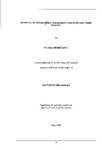BENEFITS OF FERMENTED LIQUID DIETS FOR SOWS AND THEIR PIGLETS
| dc.contributor.author | DEMECKOVA, VLASTA | |
| dc.contributor.other | Faculty of Science and Engineering | en_US |
| dc.date.accessioned | 2013-11-21T14:34:41Z | |
| dc.date.available | 2013-11-21T14:34:41Z | |
| dc.date.issued | 2003 | |
| dc.identifier | NOT AVAILABLE | en_US |
| dc.identifier.uri | http://hdl.handle.net/10026.1/2816 | |
| dc.description.abstract |
A programme of study was undertaken to asses the antimicrobial and potential immunological properties of fermented liquid feed fed to sows in late gestation period. A liquid feed fermented with Lactobacillus plantarum fed to the pregnant sow in late gestation had the potential to beneficially modify the microflora the lactating sows introduces into the environment, which was consequently reflected in beneficial changes in the gut microflora of their litters. In addition, colostrum from sows fed FLF had a significantly greater mitogenic activity on both intestinal ce11s (79326 ± 3069 CPM) and blood lymphocytes (1903 ± 204 CPM) compared with colostrum from dry feed fed sows (53433 ± 1568 CPM and 1231 ± 61.4 CPM respectively). The combined effects of higher milk quality and the reduction in the level of environmental contamination with faecal pathogens, achieved by FLF, may be important in achieving improved health status for both sows and piglets. A series of in vitro experiments were conducted in order to select a suitable new starter culture from LAB of porcine origin, which would have similar fermentative abilities to Lactobacillus plantarum, but could exert possible 'probiotic' effects on the host (pregnant sow). From a total of 87 faecal Lactobacillus strains, a homofermentative aggregating Lactobacillus salivarius, was selected for further in vivo studies as it was able to resist bile and acid conditions, had good adherence abilities to a11 intestinal compartments (mucus, epithelial cells, collagen), as well as being a potent stimulator of interleukin (IL)-12. In addition, it had comparable fermentation properties to the Lactobacillus plantarum that has been widely used to ferment FLF in this laboratory. In vivo experiments with porcine Lactobacillus salivarius strongly indicated that this bacterial strain is an effective inoculant for FLF, with a potential double role: the role of the starter culture and the role of probiotic. This could help sows to overcome disorders due to the stress associated with farrowing, enhance immunity of newborn piglets through better immunological quality of colostrum and control pathogen challenge for both sows and their newborn piglets. | en_US |
| dc.language.iso | en | en_US |
| dc.publisher | University of Plymouth | en_US |
| dc.title | BENEFITS OF FERMENTED LIQUID DIETS FOR SOWS AND THEIR PIGLETS | en_US |
| dc.type | Thesis | |
| plymouth.version | Full version | en_US |
| dc.identifier.doi | http://dx.doi.org/10.24382/3375 |
Files in this item
This item appears in the following Collection(s)
-
01 Research Theses Main Collection
Research Theses Main


